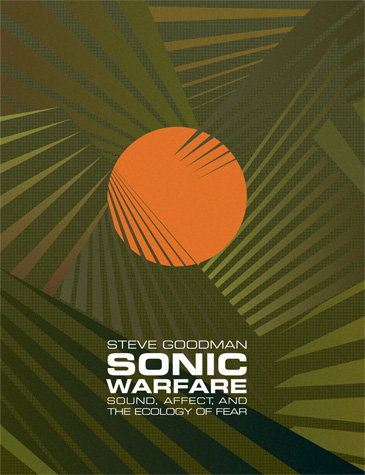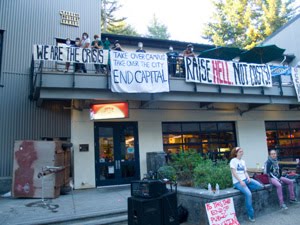December 25, 2009
'Everything is impossible now ...'
A merry Christmas to all readers, especially to the trolls and grey vampires, who need the good cheer more than most...
Some recommendations and links:

1. Two sections from the breathtaking climax of Jameson's Valences Of The Dialectic - a work that is by turns frustrating, dense and opaque, elusive and mist-like, exhausting, tragic, moving, galvanising, inspiring - a genuinely monumental achievement:
- We have indeed secreted a human age out of ourselves as spiders secrete their webs: an immense, all-encompassing ceiling of secularity which shuts down visibility on all sides even as it absorbs all the formerly natural elements in its habitat, transmuting them into its own man-made substance. Yet within the horizon of immanence, we wander as alien as tribal people, or as visitors from outer space, admiring its unimaginably complex and fragile filigree and recoiling from its bottomless potholes, lounging against a rainwall of exotic and artificial plants or else agonizing among poisonous colors and lethal stems we were not taught to avoid. The world of the human age is an aesthetic pretext for grinding terror or pathological ecstasy, and in its cosmos, all of it drawn form the very fibres of our own being and at one with us in every post-natural cell more alien to us than nature itself we continue murmuring Kant's old questions - what can I know? What should I do? How may I hope? - under a starry heaven, no more responsive than a mirror or a space ship, not understanding that they require the adjunct of an ugly and bureaucratic qualification: what cn I know in this system? What should I do in this new world completely invented by me? What can I hope for in alone in an altogether human age? And failing to replace them by the only meaningful one, namely how can I recognize this forbiddingly foreign totality as my own doing, how may I appropriate it and make it my own handiwork and acknowledge its laws as my own projection and praxis?
And the theory-poetry of the very last paragraph which, to say the least, has a bearing on capitalist realism:
- ... We may argue that Utopia is no longer in time just as with the end of voyages of discovery and the exploration of the globe it disappeared from geographical space as such. Utopia as the absolute negation of the fully realized Absolute which our own system has attained cannot now be imagined as lying ahead of us in historical time as an evolutionary or even revolutionary possibility. Indeed, it cannot be imagined at all; and one needs the languages and figurations of physics - the conception of closed worlds and a multiplicity of unconnected yet simultaneous universes - in order to convey what might be the ontology of this now so seemingly empty and abstract idea. Yet it is not to be grapsed in this logic of religious transcendence either, as some other world after or before this one, or beyond it. It would be best, perhaps, to think of an alternate world - better to say the alternate world, our alternate world - as one contiguous with ours but without any connection or access to it. Then, from time to time, like a diseased eyeball in which disturbing flashes of light are perceived or like those baroque sunbursts in which rays from another world suddenly break into this one, we are reminded that Utopia exists and that other systems, other spaces, are still possible.
2. "Everything is impossible now, including the so-called status quo." Interview with me by Matt Fuller on the Mute site.

3. Me on Ellis Sharp's highly recommended Dead Iraqis:
- Sharp's stories work best when there is a logic -- not a traditional narrative logic, but a logic of association and correspondence -- motivating his juxtapositions. This is emphatically the case in Sharp's masterly 1992 story "The Hay Wain", in which the serenity of Constable's supposedly timeless painting is violently disrupted by proletarian rebellion. In "The Hay Wain", English culture and history become a repeating labyrinth where the rebels are always on the run from the forces of power and privilege. Fleeing Peterloo, Jack Frake eventually stumbles into the Suffolk scene Constable is painting; meanwhile, in 1990, a Poll Tax rioter takes refuge in the National Gallery and "notices what he has never noticed before on biscuit tins or calendars, or plastic trays on the walls of his aunt's flat in Bradford, those tiny figures bending in the field beyond."
- Sharp replaces the dominant pastoral image of the English countryside, not with a deflated quotidian realism, but with a different kind of lyricism, one coloured by revolt: fields and ditches become hiding places or battlegrounds; landscapes that on the surface seem tranquil still reverberate with the unavenged spectral rage of murdered working class martyrs. It is not the sunlit English afternoon that is "timeless", but the ability of the agents of reaction to escape justice. When the Poll tax rioter is clubbed by police and his blood starts to stain Constable's emblem of English nationhood, we're uncomfortably reminded of more recent episodes. "He was resisting arrest, right? Right mates? (Right, Sarge.) ... We used minimal force, right? ... Don't piss yourself and we'll see this thing through together, right mates? ... Everyone'll be on our side, remember that. The commisioner. The Federation. The papers. And, if it comes to it, the Coroner. Now fucking go and call for an ambulance."
4. German readers check out the latest issue of Skug, which includes an interview with me, and a review of The Resistible Demise Of Michael Jackson. On which, see the venerable Maggoty Lamb's verdict
December 19, 2009
War On Pop 2.0
 |  |
On the face of it, the struggle over the Christmas number one this year sums up capitalist realism's strangehold over culture. From one persective, what we have here is a simulation of disputation, one Sony BMG act versus another, where capital wins every way up - abetted by a grassroots Facebook campaign that has fed the marketing machine while ostensibly raging against it (retailers and Sony BMG must be delighted that members of the public have off their own back come up with a way of remarketing ye olde commodified rebel rock). Yet it's worth also attending to the utopian dimension at work in both the campaign for the Rage Against The Machine to be number one and (submerged) in the X Factor phenomenon itself.
The problem is that no response to the X Factor phenonemon is adequate: whether it be the standard bourgeois "I don't watch it, I don't have a TV, altough I occasionally watch serious documentaries on the IPlayer", the PoMo "I watch it to exult in how awful it is", or some version of apparently ingenuous engagement - any response seems useless. The X Factor has seemed as impregnable as capitalism. In one of the best pieces he has written for some time, Paul Morley captured very well the quandary that the X Factor presents. "What's the point of watching the show," Morley asked, "and feeling that I must be losing my mind, because I seem to be seeing and hearing bad, unsavoury, deeply uncomfortable things, while everyone else is enjoying a cheery, light-hearted party, fun for all the family, a Saturday night television show that is merely an ingeniously produced newfangled way of keeping alive certain old-fashioned light entertainment values?" Complaint seems both churlish and impotent; or else irrelevant - why be concerned about the X Factor at all? Aren't there more important things than this high-gloss trivia?
Yet X Factor's full spectrum dominance of entertainment media itself makes it something to be reckoned with. Witness, for instance, none other than Pete Waterman's description of the X Factor's reach:
- Every newspaper and magazine I pick up is full of it. It takes some doing to avoid hearing about it on TV and the radio. And each Monday morning I'm treated to a digest of the latest show as I travel by train to work from my home in Cheshire.
I sit in a first-class carriage on the Liverpool to Euston route. You might think my fellow commuters - businessmen, MPs, a clutch of lawyers and a smattering of City brokers - had better things to discuss on the two-hour journey. Our ailing economy perhaps, or the state of public transport? Apparently not.
Waterman's irritation no doubt stems in part from the supercession of his type of hands-on producer-entrepreneur by Cowell's brand of hustler-manager media professional. As I argued last week in New Statesman, Cowell is surely the most important cultural figure of this dreary decade because he personfies the alluring-appalling synergy of business ontology and reality TV that has dominated the 00s. Waterman's experience of the X Factor is surely widely shared: while the series was on, in practically every cafe I would go in, in every bus I would travel on - and not only on Monday morning - there would be someone talking about the X Factor. Reading Waterman's description of his commute, though, I was reminded of nothing so much as Greil Marcus's claim, in Lipstick Traces that "[j]udged according to its demands on the world, a Sex Pistols record had to change the way a given person performed his or her commute." The pop milieu that the Sex Pistols breached, Marcus wrote, was the milieu
- where, commuting to work, doing one's job in the home or the factory or the office or the mall, going to the mall, going to the movies, buying
groceries, buying records, watching television, making love, having conversations, not having conversations, or making lists of what to do next, people actually lived.
With its successful reduction of popular music to light entertainment managed by specialists, the X Factor constitutes something like the final phase of a depunking of the pop milieu. Yet, through its very irradiation of everyday life, the X Factor keeps alive a pop milieu that - in theory at least - could be open to some kind of breach. The X Factor is (non)event TV because it resists the tendency towards narrowcasting or access-anytime entertainment: it has to be seen live, it depends upon millions of others also watching it at the same time.
Which I think brings a different angle on the situation that David Stubbs described in the Quietus a few weeks ago:
- The drift has been away from the centre, no Big Thing but countless little things, exiled from the possibility of iconic success but no less worth attending to for that. The entryism of the past, the complex negotiations between integrity and commercial success, are all history. Things are more simplistic now. It's all happening out there, down here.
The problem for me is that the "countless little things" do not resonate in the same way when they are destined to be forever "little things", when they have no prospect of entering the mainstream, nor any designs upon it. Carl is right: antipathy and contestation are crucial .., and they can only register in the kind of space that the X Factor occupies, and dominates.
With the X Factor, popular culture and some notion of the public (however degraded) coincide, as they did on something like Top Of The Pops. But the differences between the X Factor and Top Of The Pops - some of them delineated in this intriguing post by Tom Ewing - bring out the contours of the shiny new Iculture conservatism. It was the combination of public space and market dynamics that made Top Of The Pops intermittently entralling: here was a space that was contested, in which the new could erupt unpredictably. The X Factor, by contrast, and as is well known, presents us with the standard Iculture 'choice' between pre-selected, ultraconservative options: it's a Tin Pan Alley 2.0 in which nothing will ever happen again.
All of which seems to resonate with the discussion of "predatory capital" and anticipatory capture in Steve Goodman's Sonic Warfare. The most significant use of sound on the X-Factor is not the blandness of the constestants' singing, but the audio-blitz used to hype the show and the performances. This flash-cutting neuronic barrage resembles the hypnotic film montages in The Parallax View or A Clockwork Organge. No sonic cliche is left unused , all those Star Wars whooshes, electricity crackles... (wouldn't it be good if someone could develop a proper typology of these sound effects used in film and TV hype - perhaps they already have.) It is a sonic war in the media sensorium, in which the "mediocre audio-visual proramming" that Underground Resistance's Mike Banks warned about is ruthlessly enforced.
In the New Statesman piece, I talked of a shiny new boredom, and boredom is certainly part of the phenomenological make-up of the current Iculture lite entertainment regime. Yet what the allure of X Factor - and of reality TV in general - has depended upon is some combination of boredom and fascination: something like a cybernetic upgrade of Heidegger's idle talk, ambiguity and curiosity perhaps. But Sonic Warfare's language of virology, of deja entendu hype-temporalities, of a militarised control of perception, seem equally apt in relation to a phenonemon which so obviously depends upon the manipulation of noise - circus barker hyperbole and crowd hysteria as well as all the FX.
The control apparatus also involves the use of hypnotic verbal commands which induce us to distrust our own eyes and ears. Shambolic performances by rehab superstars such as Whitney Houston (madwoman fresh out of the attic) and Robbie Williams (pupils dilated enough, Robbie?) are routinely greeted as "amazing". The effect is not to convince us that the performances are good, but rather to indicate the imperviousness of the 'official' PR narrative to our response. Even if we have seen that the emperor is naked, the big Other has not. The situation is reminiscent of Deleuze and Guattari's claim in A Thousand Plateuas that official announcements concern not what is true, but what we are now supposed to believe. The juggernaut will roll on, whatever we think. Ignore the quality, look at the sales figures now being flashframed onto your optic nerve.
The significance of the RATM thing might be to hold up the juggernaut, in what would be a proper negation of a negation, the termination of a non-event. Could it be time for another war on pop, such as was declared by Ian Penman twenty-five years ago, at the moment that postpunk finally died and the media chat vortex which now consumes and subsumes everything started to coalesce?
- "To speak of a War on Pop - as one would a war on land, war on potentially dangerous dangerous territory, war on an empty stomach.
Or of War on Want: war on lack, on something missing and desirable, to speak of a poison or virus that is also our remedy, an enemy that is also our goal, a formidable opponent, a lost ideal?"
December 13, 2009
Capitalist Realism after the crash
 |  |
I'm very grateful for all the kind words about Capitalist Realism, especially the extended reviews from Woebot, Siobhan and Darren.
As to Matt's comments about discussion boards - in a way the very existence of the book is its own answer to those queries. It's almost certainly the case that the book was produced in the same time slots in which I would previously have loitered in comments boxes and on discussion boards. Part of the problem with online debate culture is that it operates on the implicit principle that there is an infinite time to rehearse and nuance positions. But 'debate' time and project time are not compatible; one has to withdraw from the former in order to embark on the latter.
If there was any doubt that capitalist realism has survived the bank crash - or that capitalist realism has nothing to do with 'realism' as such - one need only look at the recent (entirely predictable) display of government cowardice in the face of the RBS directors. All that hot air about the threat of "talent" leaving the bank if they are not paid bonuses.... Such rhetoric played a crucial role in the ludicrous overinflation of business and managerialism over the last thirty years which served as an ideological cover for capital accumulation. (That the adjective "talent" should ever be applied to bankers is condemnation enough of neoliberal culture.) Such puffery ought to have been exploded by the events of the last two years, yet the bankers are being allowed to persist in their fantasies, which are now being sustained at taxpayers' expense. The fantasy that they were "talented" was already exorbitant during the boom - now, when they are exposed as not even competent by any standards that would apply to mere mortals, it is a sick joke. It is like one of those P K Dick stories in which a terrible catastrophe has happened, but a small elite exist in a simulated world, unaware that it has even occurred. But outside the protected pod, workers face ever harsher conditions in the name of the very 'realism' from which the financiers and managerialists are mysteriously exempt.
As ZoneStyxTravelcard pointed out via twitter, the accounts by the pseudonomymous postal worker Roy Mayall of the managerialism tyrannising Royal Mail could have come directly from the pages of Capitalist Realism. See, for example, his LRB diary, an essential account of what is really at stake in the recent postal strikes, as well as his recent blog entry. "The ‘market’," he writes in that blog post, "is essentially a ploy by which one group of people’s interests are imposed on the rest of us. The postal trade is at the front line of a battle between people’s needs and the demands of corporations to make ever increasing profits." It's right to put inverted commas around 'market' here, because, as is well known, supposed 'marketization' has typically functioned as a cover for the super-rich to increase their wealth and for managerialists to impose business ontology on services which previously had other imperatives beyond mere profit. But there are all sorts of unexplored political potentials in the Braudel/D-G/DeLanda conception of capitalism as an anti-market. The Anti-Oedipus point about 'going further in the direct of marketization' is rather hastily dismissed as cryto-neoliberal accelerationism. For instance, it is possible to reframe much of the very interesting discussion about the possibility of a proletarian university in terms of the question of marketization. At the moment, teachers, lecturers and other public servants suffer from asymmetric marketization. We continue to operate as workers in the old Fordist way, whereas students are now 'consumers' and 'clients'. But there are surely many ways in which a more direct market relation between students and teachers - bypassing and obsolescing the managerialist bureaucratic machines which soak up money, energy and other resources - would be much preferable to this worst-of-all-worlds scenario. Consider the situation IT's correspondent Dave describes - "People could pay a small fee depending on the cost of the space etc. People on benefits come for free. Those with jobs pay in full. Students get concessions. Lecturers get paid something." This is a kind of market, one that would be far more sensitive and supple - not to mention egalitarian - than the simulated market imposed on education by managerialists. What if teachers and lecturers operated more like doctors and lawyers, with management reduced to sorting out premises and facilities? At a time when the conventional university sector is increasingly undermining its own status, it is worth thinking quite seriously - and experimentally - in these apparently utopian directions. Instead of working class students getting into debt to take courses that overworked and underpaid lecturers don't want to teach them, why not develop another sort of institution altogether? Why not develop an alternative system of accreditation that could compete with the university system? One reason that the university occupations are a positive development is that they have the potential to themselves instantiate this new kind of institution. Here we have an example of what Peter Hallward calls the "practical sufficiency" of political will - it isn't a matter of petitioning an Other, but of demonstrating the irrelevance of the Other. Here is what universities would look like without managerialsts: much better places. Rather than a protest whose demands could never be met, the occupations start with a set of very determinate demands - reduce the fees - which certainly could be met. But the pursuit of achievable demands engenders practical collectivity which is no longer satisfied with these specific demands, and which - by its very existence - is already pointing beyond them.
Thinking in these ways can contribute to solving the problem that Roy Mayall's blog post seeks to address - the lure of nostalgia; or, rather, the accusation that any opposition to managerialism is a hankering for the past. Robert McCrum's review of Mayall's book is not, however, some perverse misinterpretation; it is rather a symptom of capitalist realism, which has successfully imposed that opposition. The postal workers lost ground when they allowed the strike to be narrativized as being "against modernization". What is needed, rather, is workers to reclaim modernization for themselves, because, as Darren comments, "nostalgic melancholy" and "bitter condemnatory memories" are of no political use. We have to write for "‘the people to come’, for an indeterminate future" because "it is only by doing so that one can ever begin to truly alter the present."
This desire to possess her is a wound: Nick Cave and masculinity as pathology
Just a brief word in response to Anwyn's two bracing attacks on Nick Cave.
I agree absolutely with Anwyn that "From Her To Eternity" was Cave's solo masterpiece. One of the great values of those early Bad Seeds songs, and those of the Birthday Party, was the way that they pathologised masculinity. Masculinity was no longer some invisible normativity, but came into view as something diseased, grisly. As I've often remarked, if women want to know what it is like to be inside the body of and brain of an adolescent male, they can do no better than listen to these songs. This is crucially not just about (lyrical) content but also form - the lurching funhouse-cum-torture chamber topographies of the music capturing the chaos of a seething reptile brain stewed in hormones and programmed by pornoscopic junk, the whole racket kept from devolving into the totally inchoate by the dumb implacability of drive, impersonated in the BP and the Bad Seeds by Pew and Adamson's bass.
All of this reaches a point of acute focus on "From Her To Eternity". This desire to possess her is a wound.... That's forensically precise: it's not her that's causing the pain, but the desire to have her... Desire emerges here as a miserable, humiliating pressure, a mocking throb as unrelenting and unforgiving as migraine; a dulling intoxicant that overwhelms sense, as the testosterone tension of the bass builds, builds, but never releases, only loops round in interminable purgatorial circuits, while Bargeld's guitar, tuned and rewired to sound like some scouring machine, screams for some kind of release, even if that means (self)destruction. Desire is a cruel mistress, but Cave's character is nothing if not a masochist who wants to remain wracked, wrecked and wounded forever .....
I hear her crying too, but that's no basis for any sort of rapport. All Cave and "the girl" share is unhappiness, but they must endure it separately, since neither one is in the position to salve the other's pain. The space the song projects - the woman in the room above him, he "shinning up" and down the drainpipe to defile her empty apartment - is an almost too perfect psychoanalytic geography. There is no sexual relationship, only an onanistic shuttling out of her nightmare and back into mine: she - a concoction of fantasmatic part-objects ("she's wearing those blue stockings I bet!") - for him; he (as Anwyn says), not even an non-entity for her.
The interesting question is what role fantasy plays in Cave's lustmord. Are the characters to be understood as fantasists who resolve the deadlocks of desire by fantasising the killing of their object of desire? (In this case, they would be like the Martin Scorsese character in the back of Travis's cab in Taxi Driver, the cuckold who enjoys his abasement while simultaneously fantasising overcoming it with a gynocidal act of violence: "have you seen what a 44 Magnum can do to a pussy?") Or are they to be thought of as actually having carried out the fantasy ... which immediately becomes a hell once it is acted out - while also not ceasing to be a fantasy?
Cave's abjection was most powerful not when he took on the role of high Romantic Outsider or a swaggering Staggerlee, but when he came out as a pathetic fantasist, the anti-cool figure of fun (this persona, and Cave's whimpers and gibberings, owing a great deal to Pere Ubu's David Thomas; I'm tempted to venture the hypothesis that Cave's music weakens to the degree that the Thomas influence is exoarcised.) Listen I know it must sound absurd... Ridicule and the ridiculous stalk Cave's characters. Take "Six Inch Gold Blade", whose first few moments sound like the rehearsal for a fantasy - a fantasy, furthermore, that consists in the recounting of the killing, which itself may well be nothing more than a fantasy. What's the point in killing a woman unless you have a (male) Other to brag and confess to? "I stuck a six inch gold glade in the head of a girl.... No laughter, no laughter". Who is this (imploring and desperate) "no laughter" directed to? The woman who has "betrayed" him? (I use quotation marks here, because it's not clear that there is any betrayal, that the "pretty redhead" was ever his in anything other than fantasy.) Or is it aimed at us, the listeners, the big Other who won't accept his tall stories as anything other than fantasy? Does it mean "no laughter" as in "don't laugh" or "no laughter" as in "that will stop her/ them laughing"? Such questions remain fascinating and disturbing while the BP and The Bad Seeds paint lurid sonic pictures of a male mind damaged and deranged by desire. At this point it's not possible to universalise or naturalise the pyschopathologies; but with the 'mature' turn to 'proper' music, things change rather. Cave's career trajectory - which gradually interested me less and less, to the point where I became indifferent and then vaguely hostile to him - is summed up by Mark E Smith's aghast vision of an alternative future in which The Fall's songs are made radio-friendly. "They'd changed it with a grand piano and turned it into a love song. How they did it I don't know." The class dimension that Anwyn points to - the snobbish self-loathing - becomes important here, because, as Cave moves from being bomemian-addict Junkyard king to middlebrow fixture, the attainment of a certain kind of respectability is in danger of making the misogyny respectable too.
(Note: sadly, I couldn't find either a version "From Her To Eternity" by the original and best Bad Sees line-up or a live version of "Six Inch Gold Blade", so you'll have to make do with "I Put A Spell On You" and "She's Hit".)